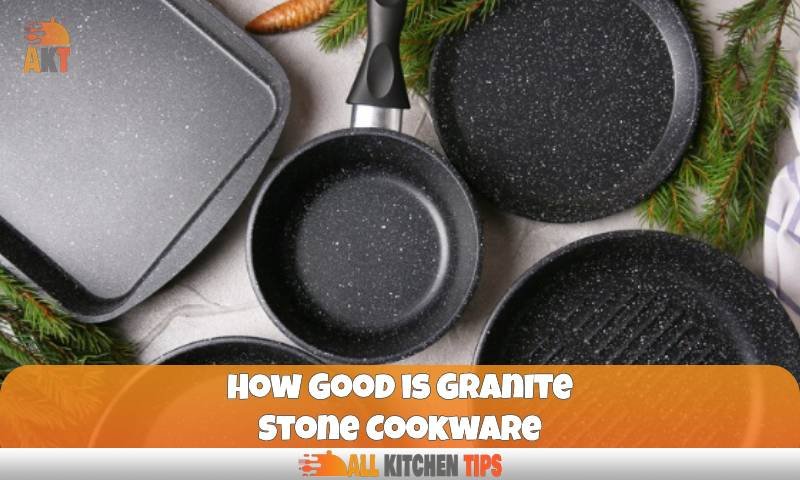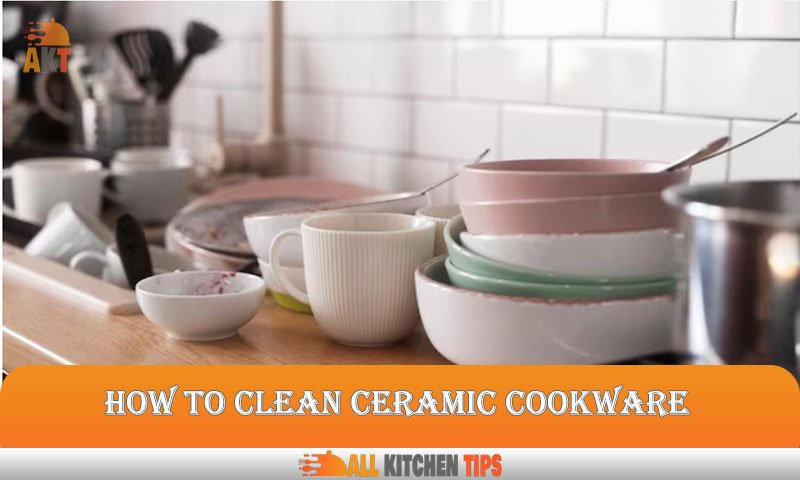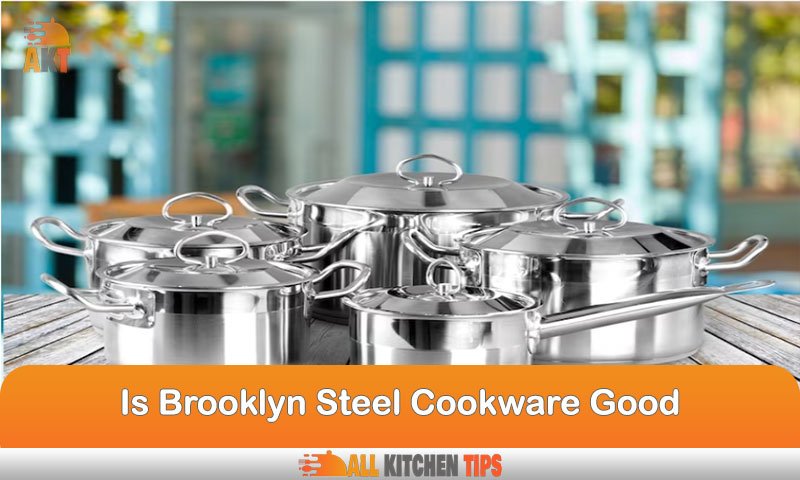Granite stone cookware has gained popularity in recent years due to its durability and non-stick properties. With its non-toxic and scratch-resistant surface, it is considered a healthy alternative to traditional non-stick cookware.
The granite stone coating is made from a combination of aluminum and ceramic, making it an excellent conductor of heat and ideal for searing, sautéing, and frying. Additionally, granite cookware is easy to clean and can withstand high cooking temperatures.
Overall, granite stone cookware can be a great investment for those looking for a long-lasting, safe, and versatile option in their kitchen.
Understanding Granite Stone Cookware
What Is Granite Stone Cookware?
Granite stone cookware is a type of non-stick cookware that has gained popularity in recent years due to its excellent heat retention, durability, and non-toxic quality. It is made by combining crushed granite with a non-stick coating and then applying it to a metal pan or pot.
Let’s take a deep dive into this versatile cookware!
The History Of Granite Stone Cookware
Granite stone cookware traces its roots back to the ancient Chinese and Egyptian civilizations. In China, granite pans were used for cooking thousands of years ago, while in Egypt, granite was used to make mortars, which were later used as cookware.
Now, with modern technology, granite cookware has evolved to be more durable and non-stick.
How Granite Stone Cookware Is Made
The making of granite stone cookware usually involves four steps. Firstly, crushed granite is mixed with a non-stick coating. Secondly, the mix is applied to a metal pan or pot in layers. Thirdly, the pan is heated to high temperatures to produce a non-stick surface.
Lastly, the cookware is cooled and polished to give it a sleek finish.
A Rundown On The Different Types Of Granite Stone Cookware Available In The Market
There is a range of granite stone cookware available on the market, and each has its own unique benefits. Below are the most popular types:
- Granite stone frying pans: They come in different sizes and are commonly used for cooking eggs, pancakes, and other foods that require flipping.
- Granite stone griddles: Large, flat pans used for cooking foods like pancakes, bacon, and grilled cheese sandwiches.
- Granite stone pots: They come in different sizes and are commonly used for cooking soups, stews, and sauces.
- Granite stone roasting pans: Used for cooking large cuts of meats or vegetable roasts.
Granite stone cookware is an excellent investment if you’re looking for durable cookware that can withstand the test of time. It’s also non-toxic and doesn’t contain harmful chemicals that can find their way into your food.
How To Unleash The True Potential Of Granite Stone Cookware

Granite stone cookware, also known as granite cookware, has become increasingly popular in recent years due to its durability, non-stick surface, and ability to distribute heat evenly. However, to fully unleash its true potential, proper care and maintenance are essential.
Here’s all you need to know to get the most out of your granite cookware.
Importance Of Seasoning Granite Stone Cookware
Granite stone cookware needs to be seasoned before its first use to enhance its non-stick properties and improve its longevity. Seasoning is the process of applying a layer of oil to the cookware’s surface and cooking it at a high temperature.
Here are the key points to follow:
- Wash the cookware thoroughly with mild soap and water.
- Apply a thin layer of cooking oil to the cooking surface of the cookware using a paper towel.
- Preheat the oven to 350°f (175°c).
- Place the cookware in the oven, upside down, for about 20 to 30 minutes.
- Let it cool down before removing it from the oven.
Tips For Proper Care And Maintenance Of Granite Stone Cookware
Taking care of your granite stone cookware is simple and straightforward if you follow these tips:
- Avoid using metal utensils that can scratch the non-stick surface. Instead, use wooden or silicone utensils.
- Always let the cookware cool down before washing it with mild soap and water.
- Do not use abrasive cleaning products, as they can damage the non-stick coating.
- Store the cookware in a dry and cool place. Avoid stacking the cookware, as it can scratch the non-stick coating.
Techniques For Cooking With Granite Stone Cookware
Granite stone cookware is versatile and can be used for various cooking methods, including frying, sautéing, and baking. To make the most of your granite stone cookware, follow these tips:
- Preheat the cookware before cooking to ensure even heat distribution.
- Use low to medium heat to avoid damaging the non-stick surface.
- Do not overheat the cookware, as it can release harmful fumes.
- Use a little bit of oil or butter to prevent food from sticking. The non-stick surface of granite stone cookware requires less oil than other cookware.
- Do not cook acidic or alkaline foods in the granite stone cookware for an extended time as it can damage the non-stick coating.
Advantages Of Using Granite Stone Cookware Over Other Cookware
Granite stone cookware has several advantages over other cookware:
- The non-stick surface requires little oil for cooking
- Durable and long-lasting
- Heat distributes evenly, preventing hot spots
- Safe for use with metal utensils
- Easy to clean
- Versatile and can be used for various cooking methods
Granite cookware is an excellent addition to any kitchen. By following these tips for seasoning, proper care and maintenance, and cooking techniques, you can unleash its true potential and enjoy healthy and delicious meals.
Granite Stone Cookware Maintenance And Care

Granite stone cookware is a durable and long-lasting alternative to traditional non-stick cookware. Due to its unique features and benefits, including heat conductivity and even cooking, it has become increasingly popular among homeowners. However, like any other cookware material, granite stone cookware must be cleaned and maintained regularly to ensure it lasts for a long time.
We’ll provide tips on how to clean and maintain granite stone cookware, discuss what you should avoid doing with it, common issues, and the best practices for storage. So, let’s dive right in!
How To Clean Granite Stone Cookware
Cleaning granite and stone cookware is a straightforward process that requires a few items. Below are the key points to keep in mind when cleaning your granite cookware:
- Use warm water and dish soap to clean your cookware.
- Avoid using abrasive scrubbers or steel wool pads as they can scratch the surface. Instead, use a sponge or a soft-bristled brush to scrub the surface of the cookware gently.
- Rinse your cookware thoroughly with warm water and dry it with a soft cloth.
What Not To Do With Granite Stone Cookware
There are a few things you should avoid doing with granite cookware. Here are some of them:
- Avoid placing empty cookware on high heat. This can cause the non-stick coating to crack or damage.
- Avoid using metal utensils, as they can scratch and damage the non-stick surface. Instead, use wood or silicone utensils.
- Avoid using abrasive cleaners such as oven cleaners, bleach, and other harsh chemicals.
Common Issues With Granite Stone Cookware And How To Fix Them
Despite its durability, granite cookware is not immune to damage. Below are some common issues and how to fix them:
- Scratches: Use a soft sponge or cloth to remove minor scratches from the surface. If the scratches are severe, it might be best to replace the cookware.
- Stains: Use a mixture of warm water and baking soda to remove stains from your granite stone cookware.
- Warping: Avoid exposing your cookware to sudden temperature changes, which can cause warping.
Best Practices For Storing Granite Stone Cookware
Proper storage of your cookware can help keep it in good condition for a long time. Here are some tips to consider:
- Stack your cookware carefully, with a towel or a cloth separating each item.
- Avoid placing heavy items on top of your cookware, as it can cause warping.
- Store your cookware in a dry and cool place.
Granite stone cookware is an excellent investment for your kitchen as it is durable, long-lasting, and provides even cooking. By following the tips above, you can ensure that your cookware lasts for a long time. Remember to clean your granite stone cookware regularly, avoid doing things that can cause damage, fix common issues promptly, and store it correctly.
FAQs
Does Granite Stone Cookware Contain Pfoa And Pfas?
No, granite stone cookware is PFOA and PFAS-free, making it a healthy alternative.
Is Granite Stone Cookware Dishwasher Safe?
Yes, granite stone cookware is dishwasher safe, making it easy to clean after use.
Can Granite Stone Cookware Be Used On An Induction Stove?
Yes, granite stone cookware can be used on all stove types, including induction stoves.
Is Granite Stone Cookware Non-Stick?
Yes, granite stone cookware has a non-stick surface, making it perfect for cooking without sticking.
Conclusion
To sum up, granite cookware is a great investment for any kitchen. It is durable, non-toxic, and convenient to cook with. Granite cookware is a safer alternative to traditional non-stick cookware and provides consistent heat distribution. Its natural stone surface is also easy to clean and maintain.
Granite stone cookware is worth considering for those wanting a healthy, eco-friendly cooking solution. Due to its strength and durability, it can last for many years. Many cooks have already switched to granite cookware and reported positive experiences. They are delighted with its non-toxicity and ability to cook evenly and quickly.
Ultimately, granite cookware is a smart purchase for those who want to cook healthy and delicious meals for years to come.





